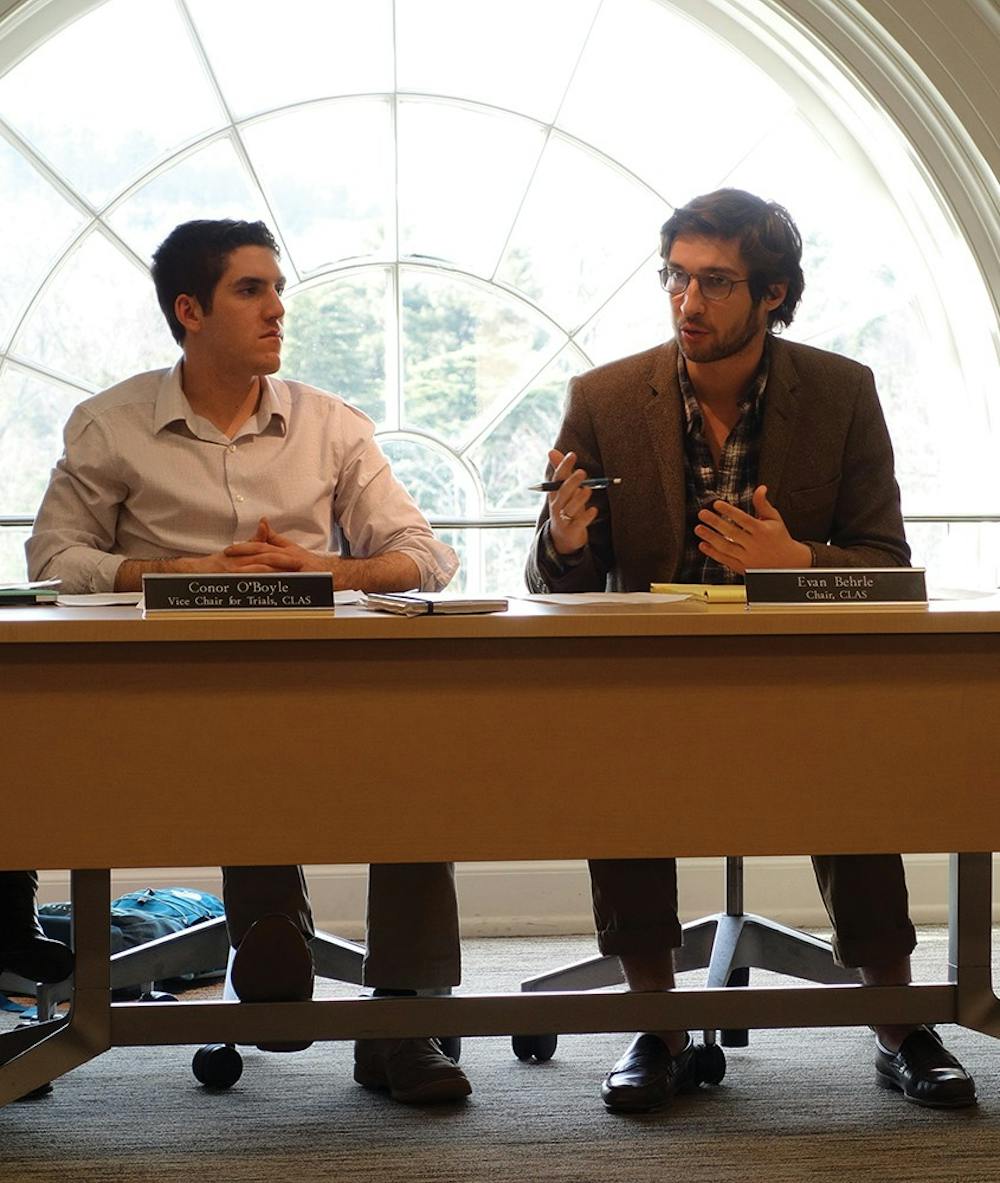The Honor Committee voted 18-3 Sunday evening to place a non-binding resolution on the student elections ballot asking whether students would prefer non-proctored exams. Five members of the Committee were absent and the Chair did not vote.
Previously, the University had non-proctored exams and students were expected to hold other students accountable for not cheating, said Honor Committee Chair Evan Behrle, a fourth-year College student. More recently, many of the University’s undergraduate exams have moved to a proctored format, though many Darden, Medical and Law exams are non-proctored.
“Some people might be thinking that [the Committee’s decision to introduce a non-binding resolution] came out of nowhere, and it did,” Behrle said. Behrle said the decision to place the question on the ballot was “unexpected.”
“I’ve never heard of a non-binding question being put on the ballot,” Behrle said during the meeting. “It seems, in the short term, relatively unprecedented.”
Behrle spoke with Former Honor Committee Chair Stephen Nash and students at other Universities during Winter Break, before bringing the idea of non-proctored exams to the Honor Executive Committee. After the Honor Committee considered the issue in meetings throughout January, Behrle and others met with Faculty Senate Chair Christopher Holstege two weeks ago to discuss the issue. Behrle said Holstege seemed receptive to having a conversation about instituting non-proctored exams.
The Committee’s debate centered around two key questions: first, whether non-proctored exams are good idea and, second, whether the Committee should poll students on the issue. Since professors can currently choose whether or not to proctor their exams, Behrle said any binding decision would have to come from the Provost’s Office or through a vote of the Faculty Senate.
Darden Representative Jessica Alvarez and Laurie Axford, a representative from the School of Continuing and Professional Studies, said the Committee had not thoroughly considered the issue.
“I think we need to be careful about the message we’re trying to convey,” Axford said, arguing for not putting the issue on the ballot. “We need to take a look at it.”
Alvarez said the vote applied mostly to undergraduate students and so threatened to alienate students at Darden and in other schools.
Engineering Representative Colin Leslie, a fourth-year who voted for putting the issue in front of students, said a no vote from the student body could seriously harm the strength of the honor system.
“[Trusting students to hold others accountable in exams] is kind of the minimum you would expect from the student body,” Leslie said. “If they do say ‘no’, then where are we with the honor system.”
Behrle said the Restore the Ideal Act debate last year — in which students struck down a referendum to eliminate student juries and simultaneously implement the informed retraction policy — taught the Committee to both seek out and trust student opinion. He said the Committee needed student input to move forward on the issue. Behrle said he will notify Holstege within the next few days to determine if major concerns arise from faculty.
“Part of me thinks it’s a risk we have to take,” Behrle said. Several other representatives saw little harm in putting the issue out for students to consider in a non-binding question.
Batten Representative Ryan Singel, second-year graduate student, said the Committee should not push the policy on faculty, no matter what the students decided.
“Something like this will only assume policy strength if it’s voluntarily undertaken,” Singel said. “I do think it would be a good idea to put a non-binding [resolution] and then just leave it at that.”
The initiative will appear on the ballot from Feb. 24-27 and the University Board of Elections plans to announce results on Feb. 28.
Committee members were also divided on the merits of non-proctored exams. Behrle said he was “unhesitatingly” in favor due to the advantages for students, faculty and the honor system as a whole.
Non-proctored exams would help students feel greater ownership of the honor system, since students would be tasked with holding other students accountable, he said.
“This is a student system where students choose to hold other students accountable [through standards made by other students],” Behrle said.
Faculty increasingly feel the honor system turns them into the enemy, since faculty report most honor cases and often do much of the enforcement work, Behrle said. In 2006, the Faculty Senate came out in favor of restoring the non-toleration clause, which said students were guilty of an honor offense if they saw one occur and did not report it.
“Faculty really want to give the system back to the students,” Behrle said. “They really want students to take care of one another. It relinquishes a little bit of the negative pressure that I think is placed on faculty members.”
Behrle said non-proctored exams would serve as a symbol of trust in the honor system and students’ ability to uphold it.
“At a school with an honor code as … robust as ours, the structures of our academic experience should bear out the existence of that honor code,” Behrle said.
Vice-Chair for Investigations Andi Chernau, a fourth-year Education student, said non-proctored exams could add additional stress to the exam environment.
“I don’t really like the idea of unproctored exams,” Chernau said. “I feel like it’s not really adding any benefits [for] students…on a more practical level.”
Vice-Chair for Trials Conor O’Boyle, a fourth-year College student, said he recognized the practical pressures put on students by non-proctored exams, but supported the policy change anyway.
“I hope we never get to the point where students see honor as a burden,” O’Boyle said.







